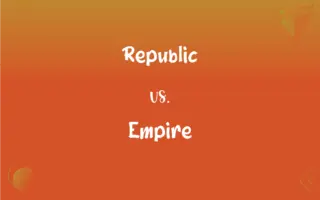Disguise vs. Pretense: What's the Difference?
Edited by Aimie Carlson || By Harlon Moss || Published on January 8, 2024
Disguise is altering appearance to hide identity, while pretense is feigning a quality or feeling to deceive.

Key Differences
Disguise involves a physical alteration of appearance or manner to conceal one's identity or intentions, often using costumes, masks, or changes in behavior. Pretense, on the other hand, is more about creating a false show or a facade, usually in terms of emotions, intentions, or abilities, without necessarily altering physical appearance.
In disguise, the focus is on the external transformation to mislead others about one's identity or to blend into a different environment. Pretense, however, is more about internal deception, where a person portrays feelings, intentions, or abilities they do not possess, without any physical change.
The use of disguise is often tangible and visible, such as wearing a costume or adopting a different persona. Pretense typically involves intangible elements, such as feigning confidence, pretending to be knowledgeable, or simulating emotions.
Disguise can be employed for various reasons like entertainment, protection, or espionage, requiring a change in one's outward appearance or behavior. Pretense, conversely, often serves social or psychological purposes, such as impressing others, hiding insecurities, or manipulating situations.
The effectiveness of a disguise depends largely on the physical alterations made and how convincingly they mask the original identity. The success of pretense, however, hinges on the believability of the false persona or emotions presented, and how well they are perceived by others.
ADVERTISEMENT
Comparison Chart
Nature
Physical alteration of appearance or behavior.
Feigning emotions, intentions, or abilities.
Purpose
To conceal identity or intentions.
To create a false show or facade.
Visibility
Tangible and often visible.
Intangible and internal.
Usage Scenarios
Espionage, protection, entertainment.
Social interactions, manipulation, hiding insecurities.
Dependence
On physical changes and behavior.
On the believability of the feigned qualities.
ADVERTISEMENT
Disguise and Pretense Definitions
Disguise
A costume or outfit worn to hide one's identity.
He donned a disguise to sneak past the guards.
Pretense
A false display of feelings, attitudes, or intentions.
He spoke with pretense of interest.
Disguise
To mask or hide the true nature of something.
She used makeup to disguise the scar on her face.
Pretense
Feigning a quality or state not possessed.
She made a pretense of confidence during the interview.
Disguise
Altering one's appearance for a specific purpose.
For the undercover operation, the agent was in disguise.
Pretense
Creating a false appearance or excuse.
He used illness as a pretense to avoid the meeting.
Disguise
A means of altering one's voice or mannerisms.
He used a disguise of voice to fool his friends over the phone.
Pretense
The act of pretending with the intent to deceive.
Under the pretense of friendship, he gathered information.
Disguise
To change one's appearance to conceal true identity.
She wore a disguise to avoid being recognized at the party.
Pretense
An insincere or affected display.
Her concern was just a pretense.
Disguise
To modify the manner or appearance of (a person, for example) in order to prevent recognition
Disguised himself as a guard and escaped.
Pretense
A false appearance or action intended to deceive
"He ran the back of his hand up her cheek, with the pretense of wiping away sweat" (Jonathan Safran Foer).
FAQs
Can a disguise include behavior?
Yes, disguise can include altering behavior or mannerisms.
Can pretense be used for good?
Yes, sometimes pretense is used to protect feelings or maintain social harmony.
What is a disguise?
A disguise is a method of changing one's appearance or behavior to hide their true identity.
What is pretense?
Pretense is feigning or simulating qualities, emotions, or intentions that one does not actually possess.
Is pretense always intentional?
Generally, pretense is a deliberate act, but it can sometimes be subconscious.
Is a disguise always physical?
Typically, yes. Disguises usually involve physical changes like costumes or makeup.
Is pretense a lie?
Pretense often involves deception, which can be considered a form of lying.
Can animals use disguise?
Yes, many animals use physical camouflage as a form of disguise.
Can pretense affect relationships?
Yes, pretense can lead to mistrust and issues in relationships.
Is a disguise always for deception?
Not always, sometimes disguises are used for entertainment or safety.
Do children use disguises?
Yes, children often use disguises in play and for fun.
Can technology detect disguises?
Advanced technology can sometimes detect physical disguises.
Can a disguise be a form of pretense?
While a disguise is a physical change, it can be part of a broader act of pretense.
Are disguises legal?
It depends on the context; disguises can be illegal in certain situations.
Can pretense be a defense mechanism?
Yes, sometimes people use pretense to protect themselves emotionally.
Do actors use pretense?
Yes, actors often use pretense to portray characters convincingly.
How is pretense detected?
Inconsistencies in behavior or knowledge often reveal pretense.
Is pretense common in politics?
Yes, pretense is often used in politics for various strategic reasons.
Is there a psychological aspect to pretense?
Yes, pretense can involve complex psychological motivations and effects.
Is a disguise effective in hiding emotions?
Disguise mainly conceals physical identity, not always emotions.
About Author
Written by
Harlon MossHarlon is a seasoned quality moderator and accomplished content writer for Difference Wiki. An alumnus of the prestigious University of California, he earned his degree in Computer Science. Leveraging his academic background, Harlon brings a meticulous and informed perspective to his work, ensuring content accuracy and excellence.
Edited by
Aimie CarlsonAimie Carlson, holding a master's degree in English literature, is a fervent English language enthusiast. She lends her writing talents to Difference Wiki, a prominent website that specializes in comparisons, offering readers insightful analyses that both captivate and inform.































































